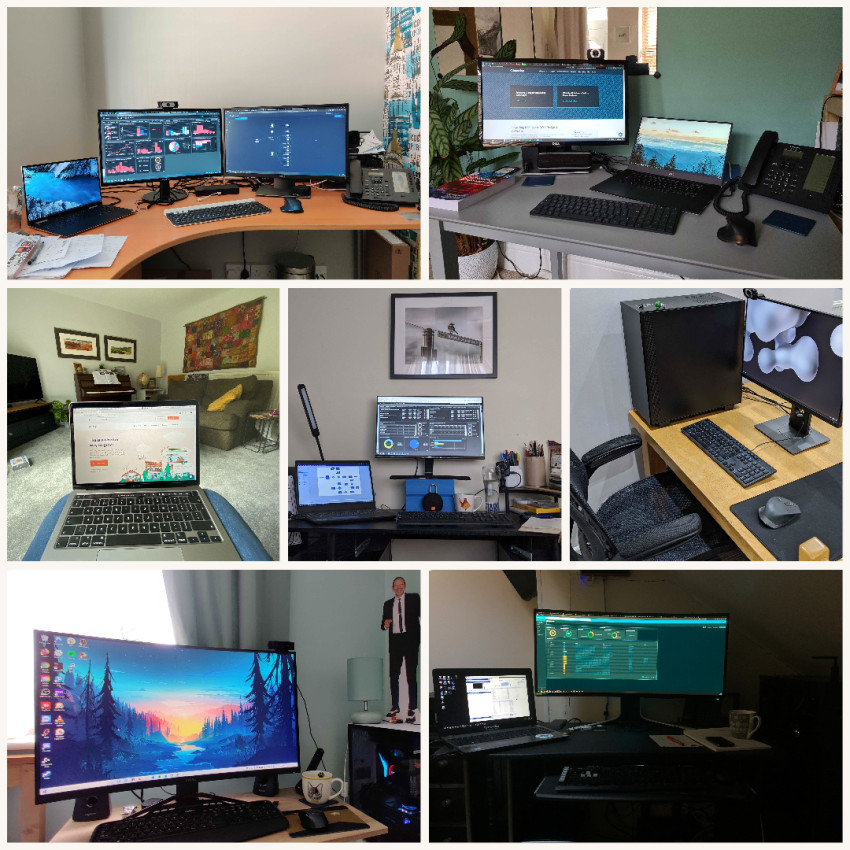Helping your workforce work from home: 6 top tips

Ed Hardie
3rd September 2020

👆 Some of the Impelling team's homeworking setups
Offices lay barren. Cleaners are being made redundant. Zoom shares are a better investment than gold. It's now been 5, 6, 7 months – who knows anymore? - since the UK was put into lockdown. Businesses have had to massively adapt to the change in working rhythm, with many of them investing huge swathes of their capital into home working solutions. But the reality is that companies up and down the country aren't going to carry on spending extortionate prices on office rent, if staff are happy and productive working from home. It simply doesn't make financial sense.
With a second nationwide lockdown looming in the shadows, home working is looking to become the new normal. Commutes now consist of walking from one room to the other - one of many obvious advantages of working from home.
But it’s not perfect, and has presented many challenges for the workforce of the UK. So here are our 6 top-tips to help your employees stay productive, motivated and healthy, whilst working from home.
#1. Help employees designate a work space
Our brain is a complex organ, easily trained. Commuting to and from the office creates a clear distinction between work and leisure. We’re creatures of habit and routine, which can make the home-working adjustment for many, very tricky. So help employees create a designated work space.
It’s imperative that employees have the ability to distinguish between work and play. Unfortunately, this requires space and money. Over the course of the pandemic many companies have already invested in home-working solutions for employees, and if it looks like the office space you once rented is going to be a thing of the past, funnel some of that newly acquired capital into helping your employees set up a manageable working environment. Providing a standard allowance for each employee to set up their home office is one route.
Or, if you’re the head of a SME and have good relationships with each employee, tailoring support may also be viable and keep costs down. A pair of noise-cancelling headphones for a parent who shares their workspace with a noisy toddler, may be far more useful than a standing desk for example.
#2. Staff perks
Creating a usable working space is important, however with the uncertainty and testing times many employees are facing, mental and physical wellbeing is imperative to productivity. Offering subsidised subscriptions to apps such as Headspace, or fitness apps, can be a great investment. Small staff perks and incentives can boost morale and efficiency hugely, so bear in mind the offset cost of a £10 per month subscription fee for the wellbeing of each employee.
#3. Stay in contact
Keep in regular contact with your team and communicate any relevant updates to the company or working arrangements. Working from home can be very isolating, so check in regularly with the team to keep both morale and communication up. If possible, arrange one-on-ones as well as video-conference calls with the whole team. Organise online socials or team catch-ups to replace the usual trips to the pub and team building exercises. Word of warning though, many now have a strong CTZ reaction when hearing the word ‘quiz’ after 6 months of lockdown, so get inventive with any organised digital socials.
#4. Trust
Business uncertainty can create unfortunate side-effects. It may be tempting to micromanage and constantly check on what the team is working on, but this will only have the opposite effect to the one desired. So trust them.
The staff are employed for a reason. They’ve been vetted via interview and are there to play their role, so encourage them to do things that may seem counter-intuitive. For example, tell them to take regular breaks to remain productive. Part of the normal office routine is “water cooler chat”; discussing with colleagues whether Carole Baskin fed her husband to the tigers. This social aspect of the working day is still important, so urge employees to keep in contact with one another – whether that be through official work channels or otherwise.
#5. Look after yourself
A change in working rhythm creates uncertainty and anxiety, especially if it’s a company you’ve founded or are responsible for managing. So don’t neglect your own wellbeing at home. Exercise regularly, create a routine, heed your own advice. Things will settle and new norms will be made, your job is to simply keep things ticking over until they are. Support your staff and they’ll support you – as long as you don’t make them do a quiz, of course.
#6. Equip to succeed
The final step is equipping your workforce with the right IT equipment to allow them to do their jobs from home. The cosy bubble of the physical office network has disappeared, and with many workers suddenly using their shared family PC to work from there are new challenges to consider. One issue this raises is how employees can access company files securely, and collaborate safely. It's no secret that digital accidents happen, but good IT not only allows your employees to be more productive, it also reduces the likelihood of anything bad happening.
We know your time is precious, and outsourcing this sort of thing is worth its weight in gold Zoom shares. So if you need a hand with any of the IT stuff for your valued employees, let us know, it's literally what we do.
